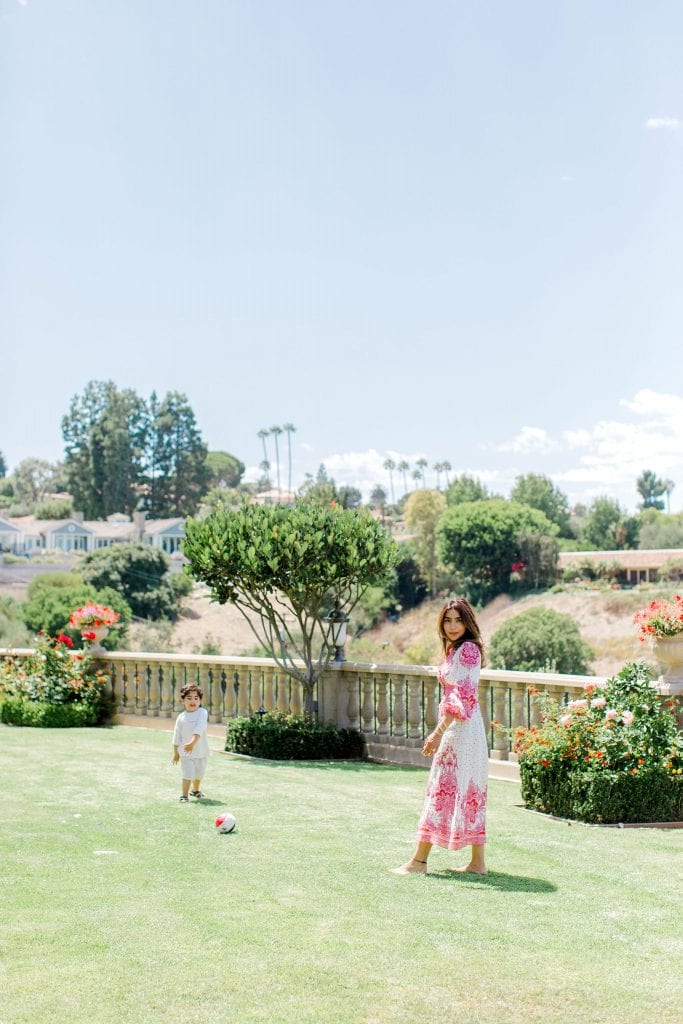
Dr. Deepika Chopra calls herself the “Optimism Doctor” but admits that she is far from the most optimistic person you’ll meet. Still, her understanding of the deep range of human emotions and challenges drew her to the study of optimism more than a decade ago.
Today, individual clients, boutique brands and Fortune 500 companies seek her out for her practical spin on optimism and self-empowerment. She holds a doctorate in clinical health psychology and completed a double post-doctoral fellowship at UCLA and Cedars-Sinai, and believes her blend of traditional credentials with optimism and visualization tools attracts even would-be skeptics. She is the creator of Things Are Looking Up optimism cards and the Looking Up podcast.
Chopra (no relation to Deepak Chopra), her husband Alex Silverman and their 3-year-old son Jag were in the middle of escrow when the pandemic hit, and those first few months of quarantining were anything but a smooth ride. Chopra’s message for us all during these unprecedented times: “It’s OK if you haven’t found the silver lining yet.”
We spoke one afternoon as she navigated parenting and work, and I found her views grounding and refreshing.
How are you and your family handling everything right now?
[At first] we didn’t have child care, and both my husband and I work full time, so we moved temporarily to my parents’ house in the South Bay. Now, for the first few hours of the day, there’s Grandma and Grandpa to help, but it’s still difficult. I can’t even leave my 3-year-old for one second without thinking there could be an imminent disaster happening. I’ll never take for granted again just being able to do everything without the imminent fear of being in a pandemic.
That’s so interesting to hear – from the Optimism Doctor.
Yes, I am an optimism doctor, this is what I do, and I actually feel in my core this is my life purpose and I’m very good at it, but I am not the most optimistic person. I am human. So, I share with people the places where I’ve worked really hard and it’s become easier for me to be optimistic, and also the places where I am working so hard, but I can’t find that silver lining. Health and medical stuff is my Achilles’ heel. I’m more neurotic than Woody Allen, so my anxiety went through such an uptick with the pandemic.
It’s refreshing to hear you be so real about your own process.
I’m doing so much education around the wave of toxic positivity that I think we’re all in. You know, the “good vibes only” posts and putting a positive spin on everything, even if it’s inauthentic, because you’re not allowed to have any feelings.
In the beginning of the lockdown, I had so many clients reaching out to me saying, “I am so worried because all of these people, all of these blogs, all of these Instagram feeds are covering the idea that if you’re more anxious and stressed out, then it’s going to further lower your immune response and that’s going to make you more susceptible to getting the virus.” We’re in the middle of a pandemic and it is absolutely normal to feel anxiety and to feel sadness!

What is your definition of optimism?
A true optimist is someone who sees the roadblocks, sees the setbacks, sees the less-than-ideal situations and is very mindful of them, but they see them as temporary and something they have the ability to overcome. They may not know how, but they know that they will and they’re able to recognize their strengths and their accomplishments, and they know that up until this point, they have overcome specific struggles. They use their past as comfort, solace and confidence in themselves.
Look at what’s going on in America right now – all of the injustice. We can be feeling horrified and angry and sad, but at the same time, there’s not much good we can do if we’re paralyzed by that. We have to find what we can do to make things better.
What are some tools that you would give people at this time?
The number-one tool is self-compassion. This [pandemic] is a new thing that none of us have been through. Give yourself space to listen to what you need.
Another tool that is so powerful is our perspective. For example, I was feeling really, really stuck and claustrophobic, and I kept saying “I’m stuck at home, I’m stuck at home.” Then I thought about my situation and I recognized my privilege. I thought, Yes, I’m stuck at home, but I’m also safe at home. And slowly I started saying “I’m safe at home.” It didn’t change my situation, but it did change my mood, my emotions, my mental health.
How has your work changed since you became a mom?
I’ve enmeshed my personal life with my professional life. So much of my brand is now around the real work of motherhood and parenting – how to help increase more optimistic children.
We have another baby on the way, by surrogacy. I had a lot of complications with my pregnancy with Jag, and they gave me a high 80% chance of not making it through a subsequent pregnancy. We’re expecting our second baby at the end of October. It has been a process that has been beautiful and joyful, but at the same time gut-wrenching. I wake up in the middle of the night sometimes sobbing. Even through my horrible pregnancy, I knew where my son was at all times – he was with me; I felt his kicks. No one really talks about all this stuff. But, it’s so rewarding as mothers and parents to share your story. Not only will it help you, but there will be so many people who can relate to it, and you can really create community by sharing.
You can find Chopra on Instagram @drdeepikachopra.
























